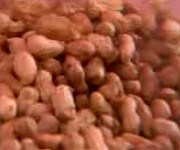Preserved endothelial function seen after consumption of high-fat meal containing peanuts
MONDAY, March 30, 2015 (HealthDay News) — The inclusion of peanuts as part of a high-fat meal improves the postprandial triglyceride response and preserves endothelial function, according to a study presented at the Experimental Biology 2015 meeting, held from March 28 to April 1 in Boston.
Xiaoran Liu, from Pennsylvania State University in University Park, and colleagues examined the impact of acute peanut consumption on postprandial lipids and endothelial function as measured by flow-mediated dilatation (FMD) of the brachial artery. Fifteen overweight males were randomized to a peanut meal containing 3 ounces of ground peanuts or a control meal, matched for energy and macronutrients, followed by the alternate meal, scheduled at least one week apart.
The researchers found that, compared with the control meal, acute peanut consumption correlated with a blunted triglyceride response two hours after consumption (P = 0.034). Between the test meals, similar changes were seen in total cholesterol, low-density lipoprotein cholesterol, high-density lipoprotein cholesterol, glucose, and insulin. The control meal decreased FMD at four hours compared with baseline (P = 0.03), while there was no significant difference seen after consumption of the peanut meal (P = 0.3).
“Previous studies have shown that individuals who consume peanuts more than two times a week have a lower risk of coronary heart disease,” Liu said in a statement. “This study indicates that the protective effect of peanut consumption could be due, in part, to its beneficial effect on artery health.”
The study was supported The Peanut Institute.
Copyright © 2015 HealthDay. All rights reserved.








